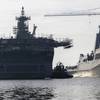Iranian Fuel Seized by US Remains in Tankers at Sea
Tankers carrying Iranian gasoline that was confiscated by the U.S. government and became embroiled in a court ownership battle have struggled to discharge in the United States, shifting course over the last week.
The U.S. Department of Justice last month seized over 1 million barrels of Iranian fuel on board four privately-owned tankers bound for Venezuela, part of Washington's efforts to disrupt trade between the two sanctioned nations.
The fuel has been at sea ever since, aboard two separate vessels that took the fuel in July and have zig-zagged at sea as they search for a terminal to discharge.
The July seizure initially appeared a win for President Donald Trump's efforts to isolate the two nations. But the ownership fight has created a legal limbo with neither vessel able to discharge.
On Tuesday, companies that claim ownership of the fuel asked a U.S. judge to release the cargoes, arguing the U.S. forfeiture "relies on a series of unfounded assumptions." Mobin International, Oman Fuel and Sohar Fuel have said the gasoline was bound for customers in Peru and Colombia, not Venezuela.
The DOJ maintains the gasoline originated with firms tied to the Islamic Revolutionary Guard Corps, and shippers took steps to mask ownership. The fuel was properly seized under U.S. sanctions against Iran, according to a DOJ court filing supporting the seizure.
Liberia-flagged tanker Euroforce, the first to arrive in U.S. waters with fuel, has been off the coast of Texas for two weeks. It secured a cargo agent and proposed to discharge at Freeport, Texas, but retreated to an anchorage off Galveston, according to Refinitiv Eikon data and Brazos Pilots Association.
The second vessel, Singapore-flagged Maersk Progress, was due at Houston on Monday. Its transponder signal was interrupted last week and it reappeared on Thursday in the Atlantic Ocean off Florida's coast, according to Eikon tracking data. As of Sep. 24, its Automatic Identification System data continued to show its destination was Houston.
An attorney for the three companies claiming ownership declined to comment. Spokesmen for the Department of Justice and Maersk declined to comment, citing the lawsuit and contract provisions, respectively.
Until the tankers can deliver the fuel to onshore tanks, the United States might face demurrage fees to keep the gasoline on the vessels.
(Reporting by Gary McWilliams in Houston and Marianna Parraga in Mexico City; additional reporting by Jonathan Saul in London Editing by Marguerita Choy)













